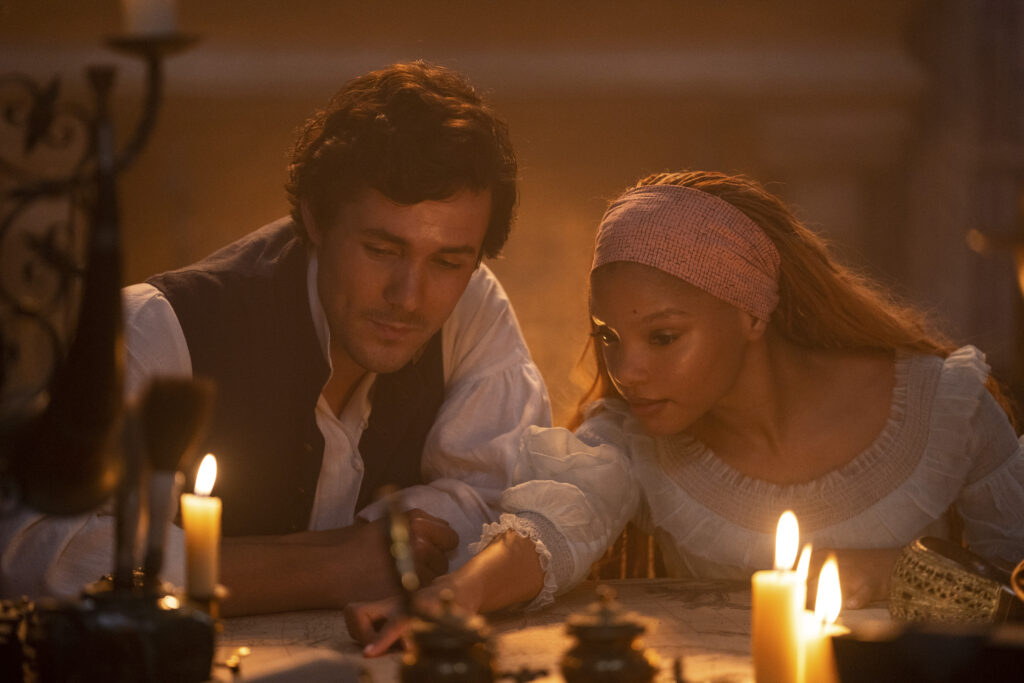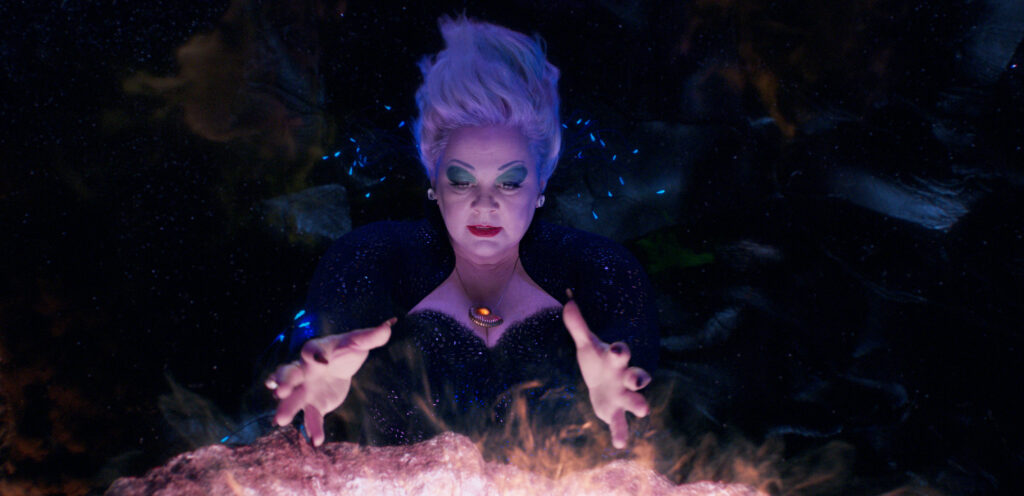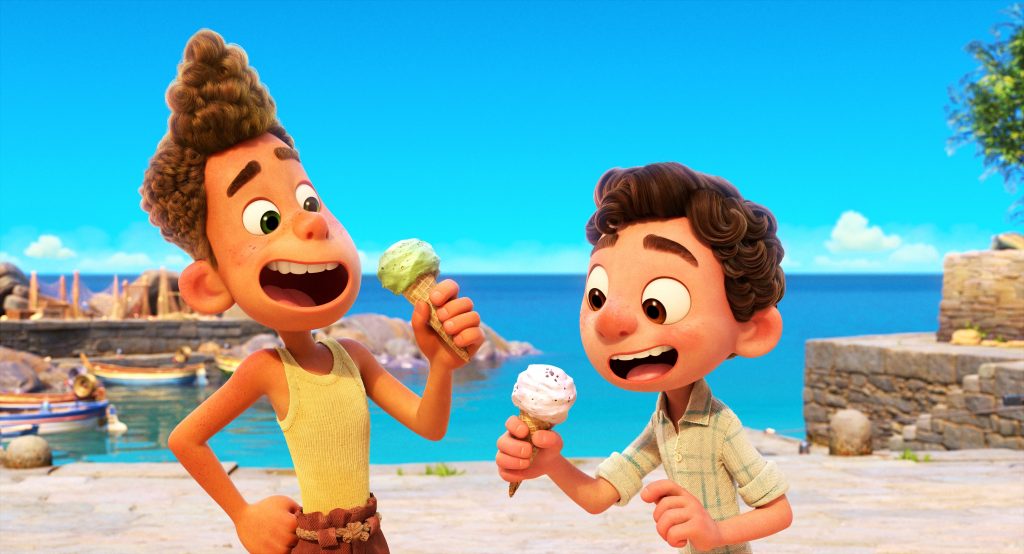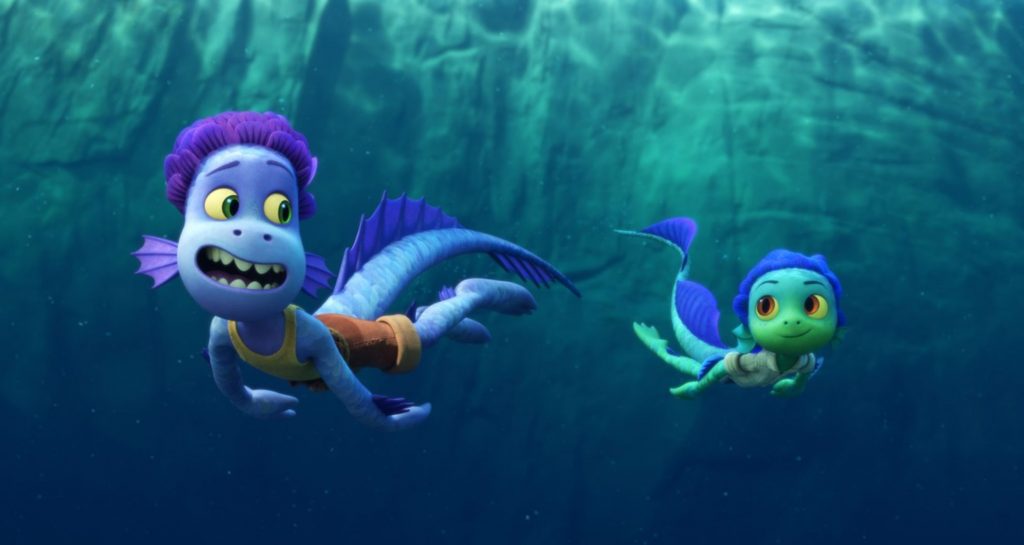May 22, 2023
by Carla Hay

Directed by Rob Marshall
Culture Representation: Taking place in the 1830s, in and around the waters of an unnamed Caribbean island, the fantasy film “The Little Mermaid” (a live-action remake of the 1989 animated film of the same name) features a racially diverse cast of characters (black, white, Asian and Latin) portraying merpeople, humans and non-human animals.
Culture Clash: An 18-year-old mermaid princess falls in love with a young-adult human prince, and she unwittingly makes a deal with an evil witch to become a human, in exchange for the witch getting to keep the mermaid’s voice and making the mermaid mute.
Culture Audience: Besides appealing to the obvious fans of the original movie, this live-action remake of “The Little Mermaid” will primarily appeal people looking for family-friendly movies with messages about love, bigotry and re-invention, but fans of the original “The Little Mermaid” might not like some of the uneven qualities of this remake.

The visual effects are uneven, and some of the characters are bland, but this live-action remake of the 1989 animated film “The Little Mermaid” has enough appealing aspects to satisfy most viewers. Halle Bailey, Daveed Diggs and Melissa McCarthy are the standout cast members. The multicultural update to the live-action “The Little Mermaid” mostly works seamlessly, although some of it looks too forced and only there for the sake of looking multicultural.
The movie remake’s three new and original songs—with lyrics by Lin-Manuel Miranda and music by original “The Little Mermaid” composer Alan Menken (who won also composed the score to 2023’s “The Little Mermaid” remake)—are very good but are not in the upper echelon of classic Disney songs. Menken won an Oscar for composing the score to 1989’s “The Little Mermaid.” The musical score and original songs for 2023’s “The Little Mermaid” work well enough for the movie, but none of it is going to win any Oscars.
Directed by Rob Marshall and written by David Magee, the 2023 remake of “The Little Mermaid” adheres closely to the original story with some noticeable changes that don’t alter the overall spirit of the original story. “The Little Mermaid” remake takes place in the 1830s, in and around the waters of an unnamed Caribbean island populated by many races. It’s in contrast to the original “Little Mermaid” which had a cast of mostly white people.
“The Little Mermaid” is inspired by Danish writer Hans Christian Andersen’s fairy tale of the same name that was published in 1837. Although the writer of the original story was a white European, the story’s location of an island kingdom could be set anywhere in a cinematic version of “The Little Mermaid.” With a Caribbean island as the central human location for this remake of “The Little Mermaid,” it makes sense that the movie would have a multicultural/multi-racial cast, since many Caribbean islands are multicultural/multiracial.
Marshall has a background in movie musicals, having also directed 2002’s Oscar-winning “Chicago,” the 2009 version of “Nine,” the 2014 version of “Into the Woods” and the 2018 sequel “Mary Poppins Returns.” This remake of “The Little Mermaid” doesn’t look entirely like a musical but more like a movie with some music video segments incorporated into the film. Viewers will have varied reactions to how the movie puts some modern hip-hop and modern dance moves in a movie that’s supposed to take place in the 1830s.
Marshall also directed 2011’s “The Pirates of the Caribbean: On Stranger Tides,” so he has experience directing big-budget visual-effects movies taking place in a sea and in Caribbean settings. Although the visual effects get better in the last third of the live-action “The Little Mermaid,” the movie has some visual effects that look disappointingly fake and sloppy in the first two-thirds of the movie. For example, the movie’s opening scene, which shows the world of merpeople who live in an unnamed sea, has some off-putting visuals that make all of the merpeople look too much like computer-generated imagery.
It’s in this sea that viewers first see the underwater kingdom ruled by King Triton (played by Javier Bardem), a widower who has seven young-adult daughters of different races and who represent the seven seas. The daughters are Tamika (played by Sienna King), Perla (played by Lorena Andrea), Caspia (played by Nathalie Sorrell), Indira (played by Simone Ashley), Mala (played by Karolina Conchet), Karina (played by Kajsa Mohammar) and Ariel (played by Bailey). Unfortunately, the movie makes all of the sisters except Ariel have utterly tepid personalities that are indistinguishable from each other, thereby making all the sisters except Ariel look like “tokens” for whatever human nationality they’re supposed to represent.
At 18 years old, Ariel is the youngest and most open-minded of her sisters, who all have been taught to dislike and distrust the humans who live on land, because humans have been polluting bodies of water, thereby killing a lot of underwater life. King Triton has strictly forbidden his daughters to go above the water. Meanwhile, humans don’t trust merpeople, especially mermaids, because humans blame mermaids for casting spells on sailors (usually by singing) and causing these sailors to die.
Ariel has the belief that everyone should be judged on individual merits and not judged based on an identity group. It’s a belief that King Triton thinks is absurd and naïve. (Bardem does a reasonably good but occasionally stiff performance as King Triton.) Ariel is so fascinated with humans, she keeps a collection of human-made artifacts that she has found underneath the sea. In this early part of the movie, Bailey does a stellar version of “Part of Your World” that will hook even the most cynical viewers into wanting to see more of the movie.
Ariel’s closest companions are an amiable flounder appropriately named Flounder (voiced by Jacob Tremblay) and a gossipy seagull named Scuttle (voiced by Awkwafina), who is easily able to observe the worlds of humans and merpeople. King Triton’s chief aide is a nervous crab named Sebastian (voiced by Diggs), who is eventually tasked with keeping an eye on Ariel when her father suspects that Ariel wants to go above the water and interact with humans. And sure enough, that’s exactly what Ariel ends up doing.
This version of “The Little Mermaid” has a somewhat drab introduction of the humans in the story. Prince Eric (played by Jonah Hauer-King), who is in his early 20s, is the heir to an unnamed island kingdom. He is first seen on a ship with several members of the royal navy, who are all very uninteresting. None of these navy subordinates has a personality that stands out from the pack. The ship accidentally becomes engulfed in flames, so everyone has to abandon the ship. Not everyone makes it out alive.
In the chaos, Eric falls into the sea, where he is rescued by Ariel and brought on shore to a beach. A groggy Eric regains partial consciousness and finds Ariel embracing him and singing to him. Eric’s vision is blurry but he is utterly enchanted by Ariel’s beauty, compassion and her voice. It’s “love at first sight” for Ariel and Eric. However, Ariel is too frightened to be seen with Eric, so she quickly returns to the ocean. Eric is eventually found by some of his ship mates.
Eric didn’t see that Ariel was a mermaid, so he assumes that she is a human. He goes back to his kingdom and tells his skeptical, widowed mother Queen Selina (played by Noma Dumezweni) that the woman of his dreams saved his life, and he’s determined to find her, because he wants to date her and probably marry her. It’s explained in the movie that Queen Selina and Prince Eric (her only child) are of different races because Selina and her husband adopted Eric when he was an abandoned baby.
Meanwhile, Ariel has become lovesick over Eric. One of the merpeople in this underwater kingdom who has noticed Ariel’s mopey mood is a sea witch named Ursula (played by McCarthy), who hatches a plan to use Ariel for a self-serving scheme to gain control of the kingdom. Ursula, who has a grudge against King Triton, is the half-human, half-octopus sister of King Triton, who banished Ursula years ago for her misdeeds.
Years before Ariel was born, Ursula thought that she would be the one to inherit the sea kingdom, but Triton was named the ruler instead. As part of this leadership position, Triton has a magical triton that has the power to be a weapon as well as way to transform creatures. Whoever owns the triton will essentially be the leader of this sea kingdom.
Ursula introduces herself to Ariel, who is wary because she heard from her father to stay away from Ursula. However, Ursula knows that Ariel and Triton have been arguing because he found out that Ariel disobeyed his orders to stay underwater. Triton also discovers that Ariel has fallen in love with the human prince whom she rescued from death. A smooth-talking Ursula uses this father/daughter conflict to her advantage.
Ursula makes a deal with Ariel: Ursula can turn Ariel into a human for three days, but Ursula will keep Ariel’s voice during this three-day period. If Ariel is able to get a “true love” kiss from Eric, Ariel can remain a human and be with Eric. But if Ariel fails to get this kiss from Eric before the three days are over, then Ariel will be turned back into a mermaid forever and Ursula will get to keep Ariel’s voice.
It’s a big risk that Ariel is willing to take. She’s transformed into a human and ends up naked (covered in seaweed and rope) when she is caught in a fisherman’s net. Ariel is given clothes by the fisherman and eventually finds her way to the kingdom’s palace, where she turned into a handmaiden, who is mute but who catches the attention of Eric. Ariel does not tell Eric that she was the one who rescued him.
Even if people didn’t already know the entire story of “The Little Mermaid,” it’s easy to predict what will happen in this Disney princess story. What makes this movie watchable are the luminous performance of Bailey, the lively voice acting of Diggs (who does a passable Caribbean accent) and the scene-stealing turn by McCarthy. The overall chemistry of the cast members works best when the characters played by Bailey, Diggs and McCarthy are on screen.
Bailey is entirely believable as Ariel, with a performance that is a skillful blend of sheltered innocence and independent curiosity. (A little joke in the movie is that Ariel believes Scuttle’s incorrect statement that a fork is a mini-triton that humans use to comb their hair. Ariel eventually finds out the truth.) Bailey shows undeniable star quality in “The Little Mermaid” (her first starring role in a movie), so it will be interesting to see what other leading-lady roles she will do after this breakthrough performance.
As the frequently exasperated and worried Sebastian, Diggs brings some swagger and bounce to a character whose loyalties are often torn between King Triton and Ariel. Sebastian is also the voice of reason when Ariel becomes too impetuous and stubborn, or when Scuttle becomes too scatter-brained and hyper. The comedy for Scuttle seems to try too hard, while the comedy for Sebastian seems more organic and natural.
Some viewers might not like the touches of comedy that McCarthy (whose speaking voice as Ursula has a lower octave than McCarthy’s real voice) brings to the Ursula character, but these moments of levity are needed and welcome in a movie that comes dangerously close to taking itself too seriously. McCarthy also handles the singing quite well, particularly in Ursula’s signature song “Poor Unfortunate Souls.” McCarthy’s version of Ursula might not be as menacing as many people expect Ursula to be, but McCarthy does a convincing job of portraying a bitter witch who feels entitled to take what she thinks is owed to her.
Viewers will also have mixed reactions to Awkwafina as Scuttle, since people either like or dislike Awkwafina’s speaking voice. One of the highlights in “The Little Mermaid” is the new song “The Scuttlebutt,” a rap-pop hybrid performed by Awkwafina and Diggs, who each has a background in performing rap music. The only drawback to “The Scuttlebutt” song is that is it shows Awkwafina has limited singing skills and sounds better as a rapper.
The other new and original songs in this version of “The Little Mermaid” are “Wild Unchartered Waters” (performed by Hauer-King) and “For the First Time,” performed by Bailey. There’s also a new reprise of “Part of Your World,” performed by Bailey. “Wild Uncharted Waters” and “For the First Time” sound more like traditional Disney musical songs. Some viewers will like that conventional sound, while other viewers will think the songs play it too safe and should have been more inventive.
Sebastian’s showcase songs “Kiss the Girl” and the Oscar-winning “Under the Sea” (with music by Menken and lyrics by Howard Ashman) join the Menken/Ashman songs “Part of Your World” and “Poor Unfortunate Souls” from the original “Little Mermaid” movie that are in this “Little Mermaid” remake. The live-action movie remake of “The Little Mermaid” has a total running tme of 135 minutes, which is a little too long for a movie that just added only three orginal songs. If the movie needed to be this long, it would have been better to replace some of the duller dialogue scenes with dazzling musical numbers that have new and original songs.
Where the live-action version “The Little Mermaid” falters the most is in not really living up to the potential to have more exciting supporting characters. Hauer-King is perfectly pleasant as Prince Eric, but his performance doesn’t have star-making charisma. Hauer-King’s chemistry with Bailey evokes more of a puppy-love crush rather than the type of passionate true love that can lead to a quick marriage. Tremblay’s capable but uninspiring performance as Flounder is overshadowed by the squawking of Scuttle and the wisecracking of Sebastian.
This live-action version of “The Little Mermaid” has a real imbalance in making the sea inhabitants much more interesting overall than the human inhabitants. Prince Eric in particular should be the type of heartthrob who makes millions of admirers swoon, but that type of magnetic romantic appeal just isn’t there in Hauer-King’s performance. Queen Selina and royal court member Sir Grimbsy (played by Art Malik), who is Prince Eric’s chief advisor and confidant, go through the usual motions, but there’s nothing exceptional about the performances of these two characters. There’s also a royal maid named Lashana (played by Martina Laird), who helps Ariel adjust to work life in the palace, but Lashana is ultimately a very generic character.
That doesn’t mean all of the sea life is compelling in this version of “The Little Mermaid.” The eel characters of Flotsam and Jetsam (who are minions of Ursula) are silent, mostly forgettable, and barely in the movie. It’s a missed opportunity to give Flotsam and Jetsam memorable personalities in a live-action remake. And as previously mentioned, the movie makes Ariel’s sisters look like soulless CGI images, instead of mermaids with specific and identifiable personalities.
In other words, this live-action version of “The Little Mermaid” is a mixed bag of flaws and assets, with more assets than flaws. Seeing this movie on the biggest screen possible just makes these assets and flaws more noticeable. The movie’s concept that a female has to change her physical appearance in order to attract and marry a man seems a little outdated in a post-feminism world, even though most of today’s beauty standards for females are still based in these patriarchal ideals. The live-action “The Little Mermaid” doesn’t quite deliver an epic and authentic-looking romance, but the movie does have some delightful performances while staying true to positive messages of overcoming bigotry and self-doubt.
Walt Disney Pictures will release “The Little Mermaid” in U.S. cinemas on May 26, 2023.


